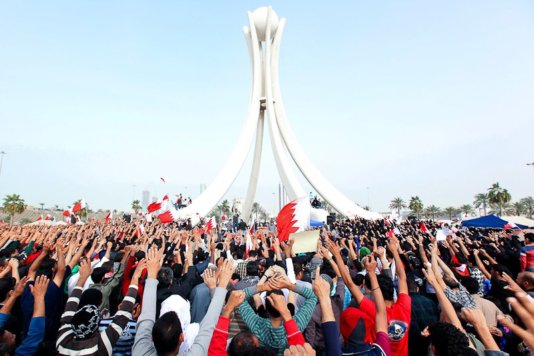- About
- Topics
- Picks
- Audio
- Story
- In-Depth
- Opinion
- News
- Donate
- Signup for our newsletterOur Editors' Best Picks.Send
Read, Debate: Engage.
| topic: | Human Rights |
|---|---|
| tags: | #Bahrain, #human rights |
| by: | Said Yousif Almuhafdha |
In 2011, the people of Bahrain took to the streets, calling for democracy, human rights, and freedom. During the protests, dozens were attacked and detained and more than 100 protestors were killed. Torture was common, and hundreds of people were jailed, including medics who were tortured after treating injured protesters. Since 2014, protests have been forbidden by law.
The Bahraini government continues to claim it respects human rights but reality indicates otherwise. Bahrain's local population is small - around 600,000 people, yet close to 5,000 of them are political prisoners and detainees, including prominent human rights activists, such as Nabeel Rajab, who received an honorary citizenship of the city of Paris this year. Among other political prisoners are leaders of peaceful opposition groups, journalists, bloggers, and social media activists who are routinely tortured in prison.
I was arrested, beaten, and put in solitary confinement in 2013 for 35 days for tweets I published about police violence. I was granted asylum in Germany in 2014 after being targeted again by the government in Bahrain. There are many more cases that are way worse than mine.
Civil society organizations have been banned in Bahrain, as was the political opposition, even though parliamentary elections are supposed to take place this year. Bahrain's two biggest political parties, The Wefaq National Islamic Society and the Wa'ad society, as well as Bahrain Center for Human Rights and many other NGOs are not allowed to operate in the country. Bahrain's only independent newspaper, Al Wasat, was forced to shut down last year.
After a decade without death penalties, executions have also resumed and 22 protester were sentenced to death; three were already executed in January 2017. Trials often rely on confessions forced out under torture. Courts in Bahrain also use revocation of nationality as a punishment. According to SALAM for Democracy and Human Rights, 232 persons have already had their citizenship revoked in 2018, and since 2012 a total number of 578 Bahraini nationals had been stripped of their citizenship, often for doing nothing other than engaging in peaceful criticism of their government.
Eric Goldstein, deputy Middle East director at Human Rights Watch said: "While authorities claim that these acts are linked to national security, they are in fact punishing many people merely for peacefully voicing dissent.” The revocation of citizenship violates basic human rights. Article 15 of the Universal Declaration of Human Rights states: "everyone has the right to a nationality and no one shall be arbitrarily deprived of his nationality, or of the right to enter his own country."
Germany has granted asylum to 30 Bahraini activists due to their genuine fear of persecution. There have been other signs of support coming from Germany. German Human Rights Commissioner Kofler has said: "Together with its partners in the EU, Germany is campaigning for the death penalty to be abolished and banned – under all circumstances and throughout the world.” This is good news, as countries like Bahrain that still carry out death penalties and executions should be pressured to abolish such practices.
Germany has strong economic links with Bahrain, but this should not stop it from urging Bahrain to improve its attitude toward human rights. In fact, the countries’ close relationship can be utilised to push for reform in Bahrain. I know that this year Germany banned arms sales to Saudi Arabia and Turkey on human rights grounds.
The German government should build its foreign policy on international respect for human rights, and it should publicly call on Bahrain's ruling Monarchy to release human rights defenders, such as Nabeel Rajab, Abdulhadi Alkhawaja, Naji Fateel and all others jailed for the peaceful expression of their rights. It should also send experts to monitor this year's elections.
Germany has the power to influence the situation in Bahrain. It should use it.
Said Yousif Almuhafdha is a human rights activist from Bahrain based in Berlin exile.
Image: Protesters fests toward Pearl roundabout in 2011, by Bahrain in pictures(CC BY-SA 3.0)
